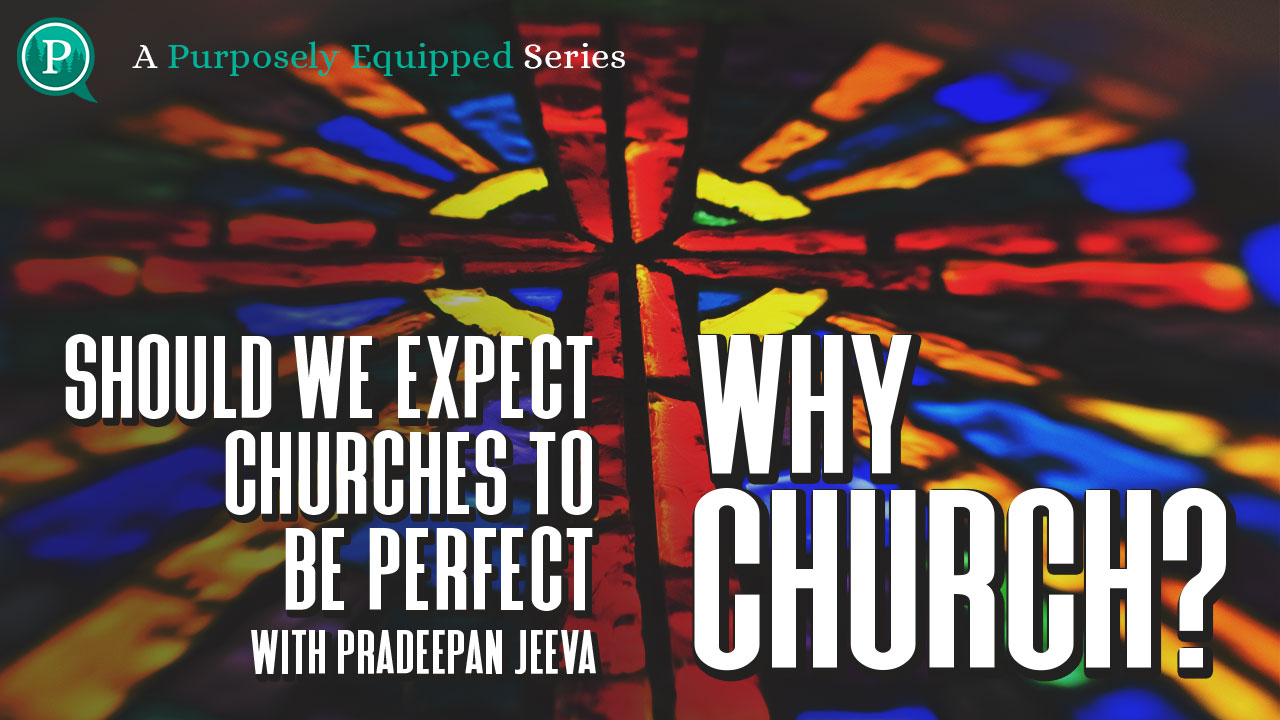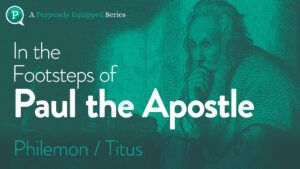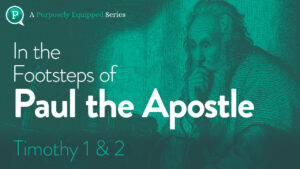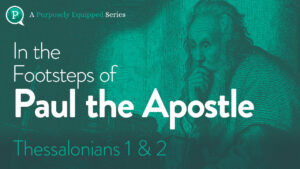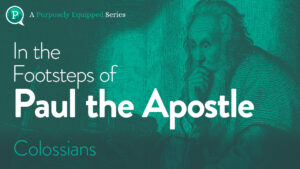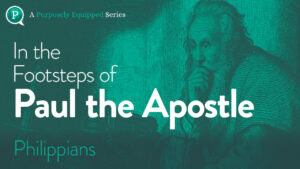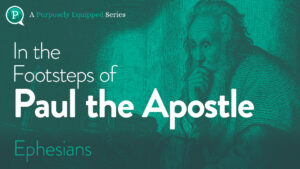Part 2 of our Why Church series as we are looking at church expectations. Can we and should we expect churches to be perfect? Pradeepan Jeeva of Kalos Church sits down with Mark Holland to discuss. Don’t miss the incredible story of how the church saved Pradeepan’s family.
Show Notes:
Find Pradeepan: Online | Instagram | Facebook
- We’d love for you to leave a review. We know most of our listeners come from Apple podcasts and if that is you, please take a moment to rate the podcast and tell us what you loved about this episode. It helps us reach more people!
Transcription:
Mark Holland:
And on the Zoom today, another pastor in our series of Purposely Equipped shows on Why Church? Why don’t you say your name, pastor? It’s an Indian name I assume, and I think I’ve maybe met you before. And again, introduce yourself.
Pradeepan Jeeva:
Well, I am Sri Lankan, though I have some heritage from India and my full name is, here it is, Pradeepan Jeevamanoharan Seevaratnam. But I’m feeling good about this time together, so just call me Pradeepan Jeeva for short.
Mark Holland:
Pradeepan Jeeva. I’ll call you Pastor Jeeva. That sounds a little easier.
Pradeepan Jeeva:
Okay, that’s fine.
Mark Holland:
Pastor Jeeva. And you co-lead a church in Bellevue. Tell us about your church. What’s the name of it?
Pradeepan Jeeva:
Yes, we have a church called Kalos Church, which means beautiful in poorly pronounced Greek. And we’re in Bellevue, Washington and Kalos, it means beautiful, and our mission is to make known the beauty of Jesus. And so my wife, Amreitha and I, we co-founded the church in 2017 after moving here from the Midwest.
Mark Holland:
So 2017. So you were pre-pandemic, you went through the pandemic like all of us. And you guys have come out of that okay. And you’re back up to full speed.
Pradeepan Jeeva:
Yeah, we launched and didn’t know a lot of people here. Our first meeting was three people. Our second meeting was five people. Then we launched a full service in Parlor Company Club, no joke, and launched a second service, started hitting hundreds of people. Salvations, had momentum, but then we didn’t have our own building, so we couldn’t find a place to meet during the pandemic. We were online for 58 weeks and then we came back to 38 people, our launch numbers. But now, thankfully, we’re stronger and healthier than we’ve ever been. We have our own building now that we just got about four months ago. And so we’ve been able to baptize people in our own space, pray together. And Kalos Church is stronger than ever, but that whole church planting process and the pandemic has been quite the adventure of faith. But we know that Jesus does the heavy lifting in church planting.
Mark Holland:
He does. And in denominations, are you part of a denomination?
Pradeepan Jeeva:
No, we’re nondenominational.
Mark Holland:
Nondenominational. Okay. Well, it sounds like a wonderful work you’ve got going there. And is it a multi-ethnic church? What kind of folks attend?
Pradeepan Jeeva:
It totally is. It’s probably the most multi-ethnic, diverse church that I’ve ever been a part of. I don’t think we have above 15% in any demographic as far as cultural background. And so we have multiple languages. I mean, we do the Christmas story every year in 12 languages or so. It’s just a beautiful congregation with different ages, backgrounds, all sorts of different people worshiping the same Jesus. And it’s kind of cool when you lift up the name of Jesus. It’s true. He does draw all nations to himself.
Mark Holland:
Well, it sounds like wonderful things happening there at Kalos Church in in Bellevue.
Pradeepan Jeeva:
That’s right.
Mark Holland:
And we are into this discussion about why church, and you have the interesting question of should we expect churches to be perfect, church expectations? You want to set us straight on what we should expect from church. So give us 10,000 foot view on this question. Maybe we’ll dive down into some specifics, but should people expect church to be perfect?
Pradeepan Jeeva:
Well, I believe that if you attend a Kalos Church service, you will experience a perfect church 100% of the time. Absolutely. Especially my preaching. No, I absolutely don’t think that on this side of eternity, that our common experience with experiencing church services, the church gathering will be perfect. And honestly, I think sometimes our ideal of what the church should be is a beautiful ideal. We have high expectations, high standards for the church. Why? Because it’s God’s church. He’s the one building the church. He’s the one watching the church with His word. He’s the one perfecting the church. But the fact is we are all in a process. We are all not perfect beings as humans. I know if there was a perfect church, the moment I walked into one of their services or the building or one of their gatherings, that church would cease to be perfect.
I think it is though beautiful, that we have this high standard for the church because it’s God’s church and He’s doing something beautiful. But that standard, I feel like that ideal, sometimes holds us back from the real of the church. In fact, there’s this quote by Dietrich Bonhoeffer, who is a theologian, a great pastor that lived in Germany during the time of Hitler. And he writes this quote that I find really inspiring, especially concerning this question. And he says, “The person who loves their dream of community will destroy community, but the one who loves those around them will create community.” And so I think sometimes we have this strong ideal, the church needs to be filled with perfect people, perfect words, no hypocrites, nobody to hurt me. But the fact is the church is filled with regular people, people who are looking to get over addictions, people who have a history or a past or they’re hurting and they’re looking for hope.
And so you have all these people from different backgrounds going through different pains and struggles. When you put those kind of people together, I mean it’s a set-up for imperfection, it’s a set-up for hypocrisy, it’s a set-up for pain and all sorts of those things. But honestly, I think that’s what the ideal of the church really is, is we’re not a museum for perfect, holy saints, but we are a hospital for broken people. And so in fact, in Jesus talking about how we should love one another, and John 15, Jesus says, “This is my commandment, not an option, not a good idea, not a suggestion.” Jesus says, “This is my commandment. Love each other the same way I have loved you. There’s no greater love than to lay down one’s life for friends. You are my friends if you do what I command.”
And so this shows me that real love is painful. It causes us to lay down our lives for one another. So I think the church is the perfect place for imperfect people, where we lay down our lives from one’s friends, that means we bleed. That means we hurt, but we do it for each other because Jesus set an example and He commanded us to do the same. And so, yeah, I don’t think that the church should be expected to be perfect on this side of eternity, but it is a chance for perfect love. God’s love to be demonstrated for people who have histories, paths, and need the grace of God in their life.
Mark Holland:
Well, it is a commandment. He wants us to be gathering together. And He said, “People will know we are Christians by our love for each other,” and it’s a great place to start. A family is obviously first, churches are made up of families, people looking for family, and it’s a testimony to the world. It seems to me that was one of the main objections I had as a ratty teenager. I don’t want to hang out with Christians or a bunch of hypocrites. That’s one of the main objections people have to going to church is, “That’s a bunch of hypocrites.” But how do we counteract that?
Pradeepan Jeeva:
I mean, honestly, I rejoice when hypocrites come to our church because hypocrites need Jesus. If I went into a gym like LA Fitness or Planet Fitness or Crunch Fitness, and I went, “Oh my goodness, this church is filled with people who are out of shape. Oh my goodness, this gym is filled with people who aren’t very fast on the treadmill or who can’t lift a lot of weight and they’re trying to, but they’re failing,” and “Oh, they’re just posing and they’re standing in front of the mirror. I can never go to that gym again because it has people who are not in perfect shape.” You would laugh at me, you’d say That’s a ridiculous concept.
Well, what is the church for? I don’t believe that the church, like I said earlier, is a place just for perfect people to gather and say, “We’re holy and we have arrived, and we are God’s perfect people.” No, we are a community that exists to be a place where we’re washed in the word of Jesus Christ. We’re equipped for the work of ministry, meaning that we haven’t been completely functionally equipped. We’re not completely operating in our gifts. And so it’s a place where we are a work in progress. And most of the people that I hear saying, “Oh, I don’t want to go to church because it’s filled with judgmental, hypocritical people.” What does that sound like? When you’re saying, “Oh, I can’t be with those judgmental, lousy, horrible Christians-
Mark Holland:
Doing the same thing.
Pradeepan Jeeva:
Yeah. You kind of sound judgmental, don’t you?
Mark Holland:
Yeah.
Pradeepan Jeeva:
And so you’re saying, “Okay, I don’t want to be judgmental like those other judgmental people, but that’s just my judgment.” I mean honestly, that doesn’t make any sense. And so I think people are projecting their own issues onto other people because if a hospital isn’t filled with sick people, if a gym isn’t filled with people who aren’t trying to get in shape, why wouldn’t a church be filled with people who are trying to work out their imperfections, trying to work out their hypocrisy and try to be conformed into the image of Jesus Christ?
Mark Holland:
Well, people are made for community. We’re longing for that. People are more isolated than ever in our society, and we want communities. And what’s better than a community of faith where you can grow in your faith? I just think the church is what a lot of people are looking for and they don’t even know it.
Pradeepan Jeeva:
Yeah, I totally agree. I mean America’s surgeon general, in the month of May, just last month, he declared that America is going through an epidemic of loneliness. And I think this search for the ideal, anything, ideal spouse, ideal friend, ideal church. Prevents us from loving the people around us. ‘Cause we have this mentality, nobody is good enough for me, but I believe it’s the beautiful reality of imperfect people coming together, acknowledging in our frailties, giving room for people to be forgiven and to extend forgiveness. I mean the beauty of showing each other mercy.
If you went to a perfect church, you wouldn’t have the opportunity to offer forgiveness. You wouldn’t have the opportunity to demonstrate grace and forgiveness. And I just think we need to acknowledge people need love. Instead of being on our high horse of saying, “I can’t go into that community where people are struggling with loneliness because they’re not my ideal.” I don’t know. I just think that’s a little prideful. And as a culture and a society, we are, I don’t know, giving into so much of these social epidemics where we’re feeding into loneliness and we’re feeling that more and more.
Mark Holland:
Well, I mean so many people just want to be a spectator and sit on the sidelines and throw potshots and judge. But I can always remember my family, my dad was more of a spectator frankly, but my mom was always, “Well, get in there and try. Get in there, join the team.” Just personal growth. That’s how you’re going to find it. You need to be a participant.
Pradeepan Jeeva:
That’s right. It’s amazing. There’s this report by Harvard. They’re really expressing the realities of this epidemic of loneliness. And specifically, they wrote this article called Loneliness in America, and it’s amazing. This secular article, secular publication, they wrote, “We need to return to an idea that was central to our founding like the founding of America and is at the heart of many great religious traditions. We have commitments to ourselves, but we also have vital commitments to each other, including those who are vulnerable.” And so I think, like Jesus said, it’s a commandment that we love one another.
And so the dark side of saying, I don’t want to go to a church because of the imperfections is saying, I don’t want to love the vulnerable. I don’t want to love people who are weak. I only want to love people who have the same social etiquette as me, people who have been given a chance to deal with all of their social anxiety, people who know the same cultural background as me and follow the same ideals as me. And if they don’t match the same struggles I have, the same sins that I have, then that church isn’t for me. And I just think that it creates an echo chamber mindset, where you’re only around people who have the same issues as you, ideals as you, struggles as you, instead of having people from different backgrounds that feel comfortable around you.
The fact is, I believe that as a society, we love grace when we’re wrong, but we want justice when we’re wronged. And so it’s like, we want people to judge us by our intentions, but we judge other people by their actions. And that creates that judgmental mindset where if the church doesn’t live up to these expectations, I can’t opt in. But I think you’re destroying the very purpose of the church in that, and you’re feeding into this very real felt need that Christians, non-Christians are feeling when it comes to loneliness.
Mark Holland:
It’s an epidemic, like you say, an epidemic of loneliness in our culture. And church is one way that God meets those needs. Probably one of the best ways really. Talk about denominations. A lot of times it’s another rejection people have. There’s so many denominations, Christians don’t get along. But it seems to me a basic reading of the New Testament, they were struggling with this idea right from the start. Different strokes, different folks, you know?
Pradeepan Jeeva:
Yeah.
Mark Holland:
Different expressions of faith are okay, it seems like with God. And don’t you think we should expect the same in our culture as well? There’s different ways that people worship God, and that’s okay. It doesn’t all have to be the same cookie cutter model.
Pradeepan Jeeva:
Yeah, there’s so many people from different backgrounds. And obviously, we’re united on the name of Jesus Christ, and we lift up his name, but the expressions, the cultures, the preferences, those can vary. And so I love this quote from one of the North African early church fathers. His name is Augustine, and he says, “In the essentials of our faith in Jesus Christ, we want to have unity. In preferentials, we want to have liberty, but in all things, we want to have charity, which is another way of saying love.” I think obviously we want to have the main things in agreement, the creeds of our faith. We don’t want to be heretical churches or endorse things that are grieving to the Holy Spirit. But as far as moving past the essentials and going into the preferentials, absolutely. Music preferences, styles of worship, language that’s used in sermons, even different strategies of ministry, I think we should expect that there is differences in the church.
And I think even in the gospels we see that demonstrated. I mean the fact that there’s Matthew, Mark, Luke, and John, and they’re sharing the stories of Jesus, but they’re not identical copies of each other. They’re not carbon copies of each other. They have their different perspectives, their nuances, their unique stories, different languages, different choices of words. And at first, some people say, “Oh, this is why I can’t believe in Jesus, because even the Bible doesn’t agree with each other.” But the fact is, if you went to a court case and all of the witnesses used verbatim the same language, you’d say, “Oh, this was rehearsed, this was scripted.” And in the gospels, we see a diversity of voices pointing to Jesus Christ with the unified intent. And in the same way denominations, yes, I know we don’t want division. I mean Jesus is coming back for one church and he prays in John 17 that would be one.
But I don’t think unity means uniformity. Unity means that we’re walking in the same direction together, that we are united in our faith in Jesus Christ and that we’re sitting under one banner. His name is Jesus Christ. And so we can drop our logos and our egos to lift up Jesus Christ. But that doesn’t mean we eliminate our names. I mean the gospels still have authors. Matthew wrote this one, Mark wrote this one. So they didn’t give up their uniqueness, their personalities. One’s writing to a Jewish audience, one’s bringing a lineage for gentile audiences, one’s focusing on the supernatural. Jesus is God. He’s not just a man. And so all those different perspectives brings power. And I think denominations have different perspectives. Different churches have different perspectives. And so honestly, I’m so thankful that the church that my wife and I lead, Kalos Church, isn’t the only church in this region. Because there are many churches here with different strengths, different beauties, and different things to lay at the feet of Jesus that I think our region needs.
Mark Holland:
Yeah, very much so. It’s a very diverse region here in the northwest. One last question I’m curious about, and that is people feel like church doesn’t meet my needs, expectations of needs to be met. I go to church, and I just don’t meet any of my needs. How can you help a person that has those kinds of feelings?
Pradeepan Jeeva:
Well, I’m thankful that you’re going to the church with needs. Like we’ve been saying, we’re not all expected to be perfect people. And I really hope that the church can be a place for healing, for resources, for helping you make friends and connections and things like that. And so that’s very real. We have people all the time coming in their lowest moments, their most hopeless moments, going through pain in their family or their life. I mean, even me, I’ve come to the church and I’ve needed a lot.
In fact, my family came as refugees from Sri Lanka to America, and my family was going to jump off a bridge altogether. They were practicing Hindus at the time. But going from Sri Lanka to America with the different language, not having a Hindu temple to worship at, having their job and education experience not count, starting from scratch was very difficult. So they decided they would jump off a bridge together. And a pastor saw my family, saw our body language, saw something wasn’t right, and said, “Hey, you don’t have to do this. Why don’t you come live with me and my family in our house?” And so my family went from wanting to end their lives to deciding through the gospel of Jesus Christ and having an optimism for the future. They decided to keep their lives and move forward. And as a child, that’s why I’m alive to this day.
And so I’m so thankful that the church was able to meet people in need. But then there comes a point, especially if you’re a seasoned Christian, where you don’t just say, “Hey, the church exists for me.” But you have a mentality, “No, the church doesn’t just exist for me. We are the church, and we exist for the world, and we’re called to be part of the great commission to go make disciples, go bring healing to a broken world.” And so I believe that being part of a church is like breathing in and breathing out. If you’re just needy the whole time and you’re constantly breathing in. You can only take in so much breath before it gets uncomfortable. You can only breathe in so much. But for a healthy body and the body of Christ is what we are. For the health of the body to operate as it’s meant to be, you have to breathe in. You’re a consumer, you have your needs met, but you’re also a contributor. You’re part of the church, you’re serving as the church, you’re giving as the church. And so you breathe out as well.
And so for those of us who go to church only expecting our needs to be met, yeah, I think there’s a season to be a baby Christian. I think there’s a season to have your brokenness be fixed and healed. But at some point, you need to be equipped for the work of the ministry. You need to not just be a consumer, but a contributor. And honestly, I think those of us who have these high ideals for a perfect church, most of the times in my experience, I’m not trying to step on toes, but it’s been people who have had a passion for the church in my experience. Or maybe they felt a call to the ministry. Maybe they even went to Bible school or seminary, and they were wanting to be part of building the church with Jesus Christ. But for some reason they said no to that calling.
Maybe it was financial reality, maybe it was the pressure of a family, but you didn’t step into vocational or occupational ministry. You never joined a team, you never served. So you have these high standards of the church, but you’re not willing to get into the game and help make it a reality. And I feel like that breeds a lot of cynicism because you become like an armchair quarterback. It’s like, I’m watching the football game. If I was a quarterback, I’d be doing things this way. If I were the pastor, I’d be doing things this way. Well, it’s a lot easier to criticize something when you’re not responsible for it. And so I think that’s why it’s important for us to have our needs met, breathe in, but also to meet the needs of others and love one another as Jesus commanded us to do and breathe out and bring hope and healing for those around us.
Mark Holland:
Wonderful words from Pastor Jeeva, Kalos Church in Bellevue. How do people find out more about your church? What’s your website?
Pradeepan Jeeva:
Our website is www.kalos.church. That’s K-A-L-O-S.church.
Mark Holland:
Kalos.church. Before we let you go, pastor, why don’t you pray for people who are listening to this. They’ve had their expectations maybe encouraged by this discussion, and they want to find out more about church, about maybe your church in particular. Why don’t you pray for those people right now.
Pradeepan Jeeva:
I’d love to. And again, thanks for having me on this. It’s an honor to be here.
Mark Holland:
Absolutely.
Pradeepan Jeeva:
Let’s pray. Dear Lord, thank you so much for giving us a place. Thank you so much for setting the lonely in families. Oh Lord, thank you that you leave the 99 to go after the one, but then you bring the one back to the 99. And so, Lord, I’m thankful that you have a vision for the 100 being gathered under the banner of Jesus. So many times, throughout the scriptures you said, “Oh, like a mother hen. I want to gather people who are like sheep without a shepherd.” And so, Lord, I pray for anybody who has been hurt by the church, who just had a difficult time entering into the church community. Maybe you have had some bad experiences, maybe you’ve been scorned or ridiculed by hypocrites or broken people in the church.
Well, Lord, I pray that you would help us to simply have our needs met by your people, by your glory and grace, but also, Lord, as we enter into the church, Lord, I pray that you would help us to be healed. But I pray that you would make us vessels of healing, Lord, that you would make all of us with our imperfections, those of us who are still dealing with brokenness. I pray that you would help us to be broken healers, wounded healers for one another, Lord. So, Lord, I pray that your ideal of the church, not our ideal, but your ideal would be made manifest. So, Lord, we pray for your kingdom to come, your will to be done. And I pray that for anybody here who’s lonely, for anybody here who’s trying to walk their faith by themselves, I pray that they would step into your love, the love that you say we can do by your example, that we would love one another as you have loved us. We pray in the name of Jesus. Amen.
Mark Holland:
Amen. And you’ve been listening to the second installment in our Purposely Equipped series Why Church? And the question, should we expect churches to be perfect managing our expectations with Pastor Pradeepan Jeeva of Kalos Church in Bellevue. For more details about the church, visit them at kalos.church. Please leave us a review of this message so more people can discover this podcast and find more episodes of Purposely Equipped at onpurposely.com.
Follow this podcast:

